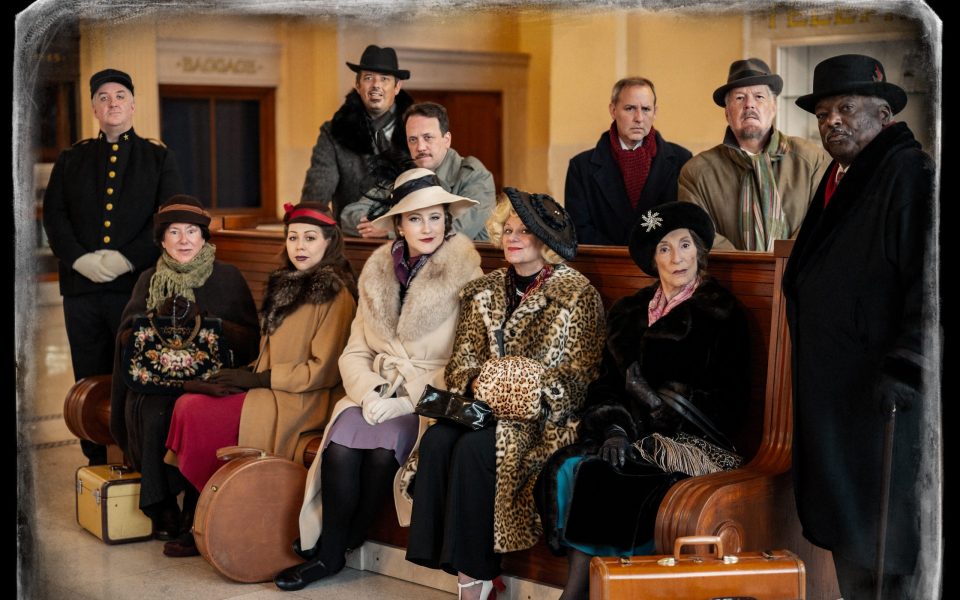Featured photo: The cast of the ‘Murder on the Orient Express has been practicing diligently these past few weeks for their performances at the Little Theatre of Winston-Salem later this month. (photo by Daniel Alvarez)
The stuffy room in a brick building off of Spruce Street hardly screams “1930s murder mystery,” but when the actors at the Little Theatre of Winston-Salem take their places in the small rehearsal space, it’s easy to forget that they’re not really sitting on a train, watching detective Hercule Poirot figure out who killed Lanfranco Cassetti.
The Little Theatre’s last few shows have all been virtual, including The Blue Death, Home for the Holidays and Hadleyburg. Murder on the Orient Express will be the second play at the Little Theatre since it reopened for in-person shows in early September. It runs Oct. 15-24.
The story is a classic, arguably one of Agatha Christie’s most popular works, that centers around Hercule Poirot, a Belgian detective and a passenger on the Orient Express train traveling from Istanbul to London. After an infamous American gangster is found dead on board, everyone still standing becomes a suspect.
The book, published in 1934, has since been adapted into various movies, TV shows, plays and even a game.
“It was so popular, so when this became available, they wanted it,” says Matthew Cravey, who plays Monsieur Buoc, Poirot’s right-hand man.
Ron Law, the director, nods.
“This is the show out of the whole season that I wanted to direct,” he says.
This version, adapted by Ken Ludwig, parses down some of the characters and includes flashbacks to earlier scenes during the second act. Ludwig, known largely for his comedy, adapted the show at the request of the Agatha Christie Estate. The show premiered for the first time in 2017 at McCarter Theatre Center for the Performing Arts in New Jersey.
“When Ken Ludwig adapted it, he adapted it like a movie, but for the stage,” says Elizabeth J. Rief, the show’s stage manager.
Adding to the pseudo-movie magic, the show’s stage will turn as the characters move to various compartments along the train. But for now, Rief and the actors just move the furniture each time the characters go into a different room.
The actors rehearse in their regular T-shirts and sweaters, but the costumes hang in the back behind them. For the real show, all of them will don heavy coats and a variety of hats. The outfits are largely various shades of black, brown and tan with splashes of red on the brim of a hat or the tip of a shoe.

Weeks before the first curtain, the actors are not quite off book yet, but they are getting close. The rehearsal was still full of notes beginning with the first line of the second act, “Touch nothing!”
In one instance, Law stopped actor Ralph Shaw, who plays protagonist Poiroit, and instructed him to deliver his lines with more annoyance and to move a few steps to the left so as not to block the other actors.
Shaw took the notes and incorporated them with ease.
Some of the actors have done theater for decades while others are new. Several were even in shows directed by Law in the 1970s and 80s.
As the show gets closer, actors express nerves about getting their lines down, but no one has more lines than Shaw. Much of the second act consists of long monologues by the detective with occasional interjections by the other characters.
With that in mind, some of the other actors still stand out. Karen Kell Chandler as Caroline Hubbard is emotive and compelling, and Joyner Horn is captivating as Countess Andrenyi, especially when her character plays off Shaw’s. All of the accents in the show are flawless, and there are many.
Even those who know the ending of this famous story will be captivated by the production. Like on the Orient Express, the journey matters far more than the destination.
Murder on the Orient Express will play from October 15 to 24 at The Hanesbrands Theater. Tickets start at $12. Learn more about the show and upcoming events at ltows.org.
Join the First Amendment Society, a membership that goes directly to funding TCB‘s newsroom.
We believe that reporting can save the world.
The TCB First Amendment Society recognizes the vital role of a free, unfettered press with a bundling of local experiences designed to build community, and unique engagements with our newsroom that will help you understand, and shape, local journalism’s critical role in uplifting the people in our cities.
All revenue goes directly into the newsroom as reporters’ salaries and freelance commissions.


Leave a Reply